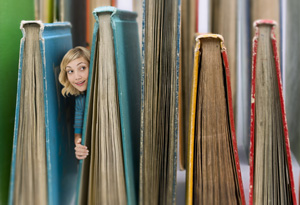The Brave Old World of Books

Photo Illustration by Thomas Allen
On reading, writing—and what the future may have in store for books.
As a writer, I have my head completely in the sand—I don't own a digital reader, and I haven't played with one. If somebody sidled up to me and plopped one in my hands, maybe...but it hasn't happened. For me, reading is a physical experience, one that vanishes, evaporates completely, the minute you read something on a screen.Books also have an architectural dimension. Rooms full of books are meaningful places where people assemble. And yet, one of the things that defines reading is its very intimacy—which is what I love about it. Even if you have a subway full of people, all of them reading The Corrections, they'd each be on a different page. It's not like watching a movie; you're not having a collective experience.
New media can be radical in the way it changes cultural behaviors, attitudes, and artistic practice. Yet there's something funky about the way new devices turn up and nestle in alongside old ones. When I look around my home office, I've got the radio on, I'm checking my e-mail, I've got a pile of books open on the desk and more on the shelves. I might stick a DVD into my computer. But lo and behold, there's, like, the fax machine off to one side, the media equivalent of the duck-billed platypus still surviving in my personal vestiary. So I tend to be sanguine about this stuff; you can allow yourself to be fascinated, but not give in to some kind of Luddite panic thinking you're about to kiss goodbye all the things that make you feel human.
I grew up working in used bookstores. I don't even really like new books. I want books to be old and to have this weird talismanic property where they've had different owners, and they convey a sense of history. When my first novel came out, I asked the designers to make it look like a used book, which some people thought was brilliant, although some bookstores opened their boxes and returned them to the publisher because they thought they had gotten a damaged shipment.
When I write, I go to a studio in a building full of visual artists. I just have a little desk shoved against a window and a computer that has no Internet. The only thing I've got available is a bookshelf. I actually think we're close to the moment when places begin to brag about not having Wi-Fi in them—that will be the commodity: "safe zones," where you can do one thing at a time. Writing and reading books is a very slow process. Forget digital media, newspapers always seemed fast to me. And I suspect people read books in order to participate in that kind of slowed time—to be processing ideas less immediately.
I'm a much more old-fashioned writer—for better or for worse—than people have taken me to be. I love novels that are sturdy and traditional in their commitment to character and narrative. For me, the action is in the conversation among readers of worthwhile, fascinating novels over a period of years. As for which books will be influential, none of us has a crystal ball. But to participate in the activity, to be a working, living writer in a context where people care, that's all I ask.
— As told to Kristy Davis
The 10 books that rocked Oprah's decade
More from O's 10th Anniversary issue



